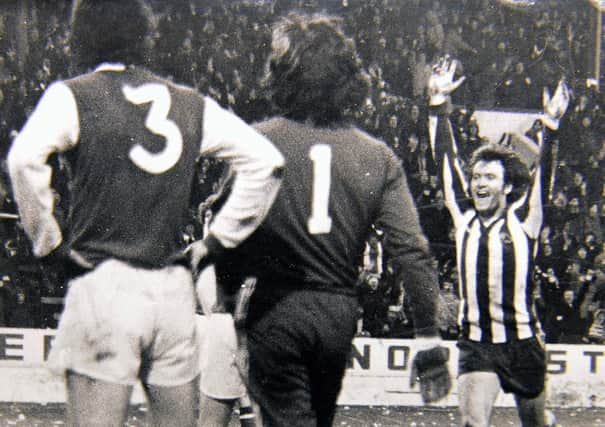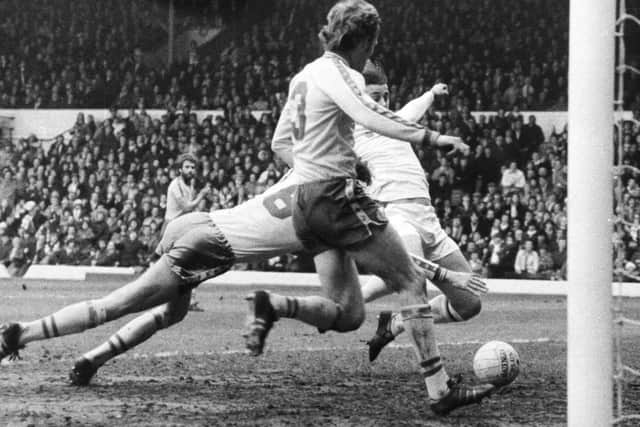Winter of discontent - When toxic cocktail of blizzards, strikes and power cuts took its toll


Then, as now, havoc was wreaked upon football’s domestic fixture list, with over 100 league matches postponed and a number being abandoned owing to blizzard conditions.
A toxic cocktail of bad weather, disrupted travel services, widespread strikes by public sector trade unions and power shortages ensured the United Kingdom was in paralysis, just as it is in danger of becoming now due to the coronavirus outbreak.
Advertisement
Hide AdAdvertisement
Hide AdIt was a time when football supporters were advised to leave grounds promptly at the end of matches after the clocks changed, so that floodlights could be switched off due to power shortages, while a Match of the Day interview with Bobby Robson after his Ipswich Town side’s 4-1 defeat to Arsenal had to be cut short when Highbury plunged into darkness.


Early in 1979, FA Cup third-round day, always a marquee date in the football calendar, proved almost a non-event, with just four matches being staged on January 6.
The opening month of the new year was notable for its almost-total absence of league fixtures in Yorkshire in January, 1979.
Incredibly, just two games were played with Leeds United – one of two Division One representatives in Yorkshire in 1978-79 along with Middlesbrough – beating Manchester City 1-0 in front of 36,303 at Elland Road on January 13 with John Hawley scoring the only goal.
Advertisement
Hide AdAdvertisement
Hide AdIn Division Two, Division Three and Division Four, just one league match was played in the county in January 1979, with Doncaster Rovers beating Hereford United 1-0 at Belle Vue on January 30, thanks to Joe Laidlaw’s strike.
No league games were staged that month at Bradford City, Halifax Town, Huddersfield Town, Hull City, Middlesbrough, Rotherham United, Sheffield United, Sheffield Wednesday or York City – and the picture did not improve too much in February.
Perhaps no club suffered more than basement strugglers Halifax, with no games staged at The Shay for 77 days from December 16, 1978 to March 3, 1979.
The Shaymen also endured the longest spell without a league match among all of Yorkshire’s league clubs, with George Kirby’s side being inactive – home and away – for 42 days from December 30 to February 10.
Advertisement
Hide AdAdvertisement
Hide AdIt was also a particularly tough time for Division Two strugglers Sheffield United, who did not play a league game at Bramall Lane for nearly two months from December 30 to February 24.
To add insult to injury, they then copped a morale-sapping FA Cup exit for good measure after being knocked out by fourth-division outfit Aldershot following a replay at the Recreation Ground after a goal from Rotherham-born John Dungworth, who later became a coach at Bramall Lane.
Meanwhile, Valley Parade did not host a league game for 63 days between December 30 to March 3 – with the Bantams forced to negotiate five away matches in a row before taking the field on home soil against Scunthorpe United.
There were also no league matches at Leeds Road, Bootham Crescent or Oakwell for exactly 60 days between Boxing Day and February 24.
Advertisement
Hide AdAdvertisement
Hide AdBarnsley had celebrated Christmas with a 6-3 win over Port Vale in the old Division Four on December 26, with player-manager and Allan Clarke scoring a hat-trick.
It was Clarke’s penultimate match as a player. The former Leeds United legend hung up his boots after a 7-0 defeat at Reading three days later following advice from that revered doyen of Barnsley – the late, great Norman Rimmington.
The Reds’ next fixture at Oakwell also proved a similarly headline-grabbing one with the hosts playing out a 4-4 draw with Stockport on their home return in late February 1979 in a season which ended in promotion.
Times that winter were rather more testing and less joyous.
Thankfully, there were a handful of games to divert the attention in an early new year that was conspicuous for its dearth of football across the Broad Acres.
Advertisement
Hide AdAdvertisement
Hide AdThen managed by Jimmy Adamson, Leeds staged a high-profile first leg of their League Cup semi-final with Southampton at Elland Road – but it was a tie which ended in disappointment with the Whites letting slip a 2-0 lead on home soil, with the Saints hitting back to draw 2-2 in front of an attendance of 33,415.
Lawrie McMenemy’s side won the second leg 1-0 at The Dell to book a place in the final against Brian Clough’s Nottingham Forest at Wembley.
Rotherham United may not have played at league level at all between Boxing Day and February 3, but did fit in two Cup games with Manchester City.
After a 0-0 round-three draw at Maine Road, the Millers went down 4-2 in the replay a few days later in front of just under 14,000 at Millmoor with Brian Kidd (2), Peter Barnes and Gary Owen on target for the Blues.
Advertisement
Hide AdAdvertisement
Hide AdYet amid the inactivity, two sides ultimately ended up being heartily sick of the sight of each other with Sheffield Wednesday and Arsenal facing each other five times in a Cup marathon between January 6 and January 22.
After a 1-1 draw in front of 33,635 at Hillsborough – on a famous occasion when Gunners goalkeeper Pat Jennings was pelted with snowballs by the Kop – Wednesday, whose goal-scorer was Jeff Johnson, drew the replay by the same scoreline at Highbury.
Rodger Wylde found the net for the Owls, with Liam Brady on target for Terry Neill’s side in a game watched by a crowd of 37,987.
Two further replays at Leicester City’s Filbert Street failed to separate the pair before a third game at the East Midlands venue eventually did with Arsenal prevailing 2-0, courtesy of goals from Frank Stapleton and Steve Gatting en route to going on to win the competition.
Advertisement
Hide AdAdvertisement
Hide AdWednesday’s opening meeting with Arsenal at Hillsborough was a rare moment of activity at S6, with no league games staged there between December 9 and March 3 – a grand total of two months and 22 days with Jack Charlton’s outfit then in mid-table in the third tier.
All told, when postponements were factored in and some scoreless previous league games, the Owls faithful did not see their side score a league goal on home soil for 133 days – four months and 10 days.
Following a 2-1 win over Exeter City on October 24, 1978 – thanks to goals from Brian Hornsby and John Lowey – Wednesday’s next goal at Hillsborough in the league arrived on March 6, with Gordon Owen and Wylde netting in an identikit 2-1 success over Gillingham.